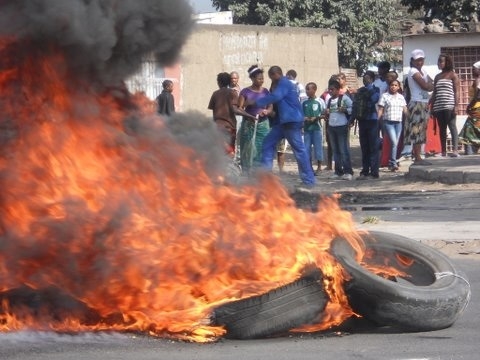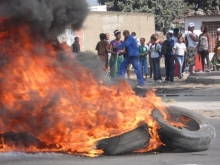
Protest marches turned violent in Mozambican capital.
Editor’s Note: Mercedes Sayagues is a Knight International Health Fellow working to improve coverage of health issues in Mozambique. She found herself in the midst of violent riots in Maputo this week, and her reporter’s instincts took over.I was 50 meters away when the bullet hit Helio Rute, slicing a chunk of his skull. Helio was 12 years old and heading home when he was caught between rioters and police on Acordos de Lusaka avenue in Maputo. He died on the spot, one of more than half a dozen killed today.

Protest marches turned violent in Mozambican capital.
As Helio lay dying, I was half a block away, comforting two wounded men and trying to get a car to stop and take them to hospital. After half an hour, a police pickup carried them away. Then I walked towards Helio. His school satchel lay to his left, a pool of blood to the right. Next to Helio was a badly wounded man, moaning softly and losing lots of blood. When police cars passed, instead of helping the wounded, police fired volleys of bullets. Helio’s aunts arrived and howled in pain. The mother suffers from a heart condition and was not allowed to see her son lying bloodied on the pavement. It was not what I had expected to find when I ventured out.
In the Savana newsroom where I work as a Knight Fellow, the staff had started calling in early: no public transport, private cars stoned on the streets, heavy police presence. The roads into Maputo were closed. Most Savana reporters could not make it into town. Some were trapped in rioting areas. I walked from my home to a nearby site expecting a peaceful march of songs and banners. Instead I found fires, bullets and violence.
I called the Savana crew and directed them to the spot. Groups of people had begun marching from the outskirts into the city. Police started firing, rubber bullets and live ammo. Chaos ensued throughout the city and neighboring Matola. “We want justice, we want justice,” the crowd chanted - until police cars zoomed by firing bullets and everyone scattered.
They were protesting increases that started today for electricity, water, bread and other municipal services. At less than US$100 a month, the minimum salary does not cover even half of the most basic, essential items for a 5-person household, and it has not for many years, says the Ministry of Health. What started as angry but peaceful protests turned quickly violent.
Until early afternoon, Maputo burnt: cars, buses and petrol stations burnt, burning barricades of tyres and rubbish, looted shops, burning anger of the poor. Groups of people began marching from the outskirts into the city.
Throughout the afternoon, from my flat, I could hear wailing sirens carrying the wounded into the nearby Central Hospital. Police vehicles patrolled the city, firing into the air to deter looters.
At one point, while diving for cover to avoid bullets, we were mugged. Three guys grabbed my cheap cellphone and my colleague’s expensive camera, and disappeared into the maze of alleys. She gave chase. I stayed put. It is only material things, I thought. The real loss is little Helio. May he rest in peace.